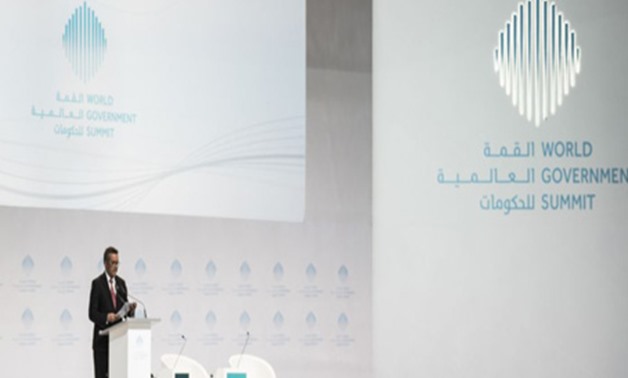
During the speech of Director General of the World Health Organization (WHO)Tedros Adhanom Ghebreyesus, at the World Government Summit 2018 in Dubai/ Egypt Today.
Dubai - 13 February 2018: “Strategic investments in health systems globally, along with improved preparedness, surveillance and response capabilities can all help us in our mission towards a pandemic-free world,” Director General of the World Health Organization (WHO) Tedros Adhanom Ghebreyesus said at a talk titled ‘Can We Create a Pandemic Free World?’ on the second day of the World Government Summit 2018 (WGS 2018) on Tuesday.
Speaking on the importance of implementing international health regulations and sustaining a strong alert and response system to rapidly detect and respond to outbreaks, Tedros said: “The ‘Spanish Flu’ epidemic remains the deadliest outbreak in history but its lessons are just as relevant now as they were then”.
“The Ebola outbreak exposed fault lines in global security. Not only did it have a devastating impact on select countries, it also had a devastating economic impact. IMF reduced growth projections for affected countries and Ebola showed us how a fragile system in one country can expose the world to danger,” Tedros added.
Tedros also emphasized the importance of universal health coverage and security. He pointed out that 3.5 billion people lack access to essential services, with 100 million people pushed into extreme poverty due to the cost of paying for care out of their own pockets.
“Evidence and experience show that health coverage is within reach. When people are healthy, entire communities and economies thrive. When communities are free from pollution and harmful diseases, they prosper,” Tedros stated.
Tedros maintained that while the WHO will catalyze proactive engagement and advocacy with global, regional, and national political structures and leaders, including heads of state and national parliaments, universal health coverage is ultimately a political choice and pursuing it is the responsibility of every country and national government.
“Universal health coverage and health emergencies are two sides of the same coin. Strengthening health systems is the best way to safeguard against health crises. Outbreaks are inevitable, but epidemics are not. Strong health systems are our best defense to prevent disease outbreaks from becoming epidemic,” Tedros noted.
Tedros ultimately stressed that there is no guarantee of a pandemic-free world but with meticulous planning, countries can limit the impact. He said: “This is not only the job of people in the health sector. Everyone has a role to play. There is room for improvement and it is vital that we map the global capacity for response.”
Tedros Adhanom Ghebreyesus was elected WHO Director-General for a five-year term at the Seventieth World Health Assembly in May 2017. Prior to his election as WHO Director-General, Dr. Tedros served as Ethiopia’s Minister of Foreign Affairs from 2012-2016. In this role, he led efforts to negotiate the Addis Ababa Action Agenda, in which 193 countries committed to the financing necessary to achieve the Sustainable Development Goals.
The World Government Summit 2018 runs from February 11 to 13 at the Madinat Jumeirah in Dubai. The landmark event convenes more than 4,000 participants from 140 countries, including heads of state and governments, as well as top-tier representatives of 16 international organizations.
WGS 2018 features six distinct forums that examine the challenges of vital sectors for the future with a view to finding the best resolutions for the greater global good. Furthermore, over 20 specialized global reports spanning key sectors and topics of the summit are being launched during the event.


Comments
Leave a Comment